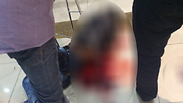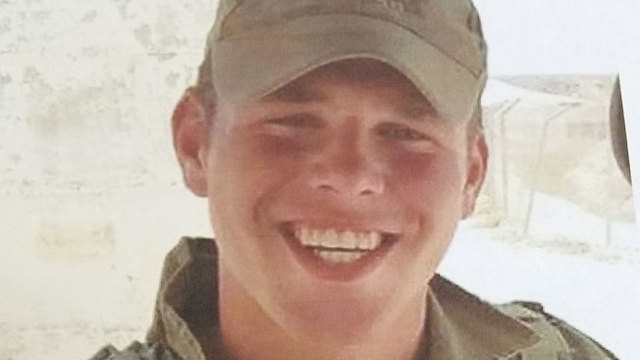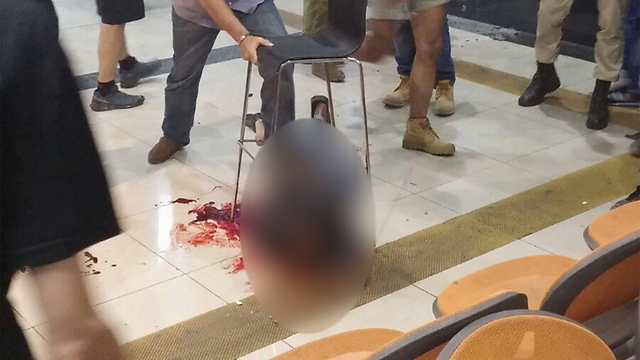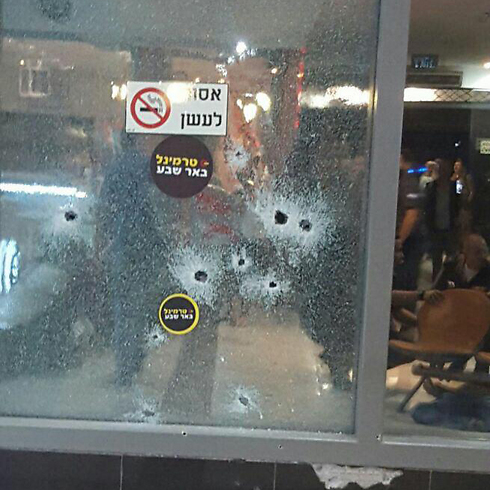
Soldier murdered in Be'er Sheva bus terminal shooting, Eritrean lynched
Sergeant Omri Levy (19) killed, ten wounded in shooting and stabbing attack after terrorist grabbed soldier's rifle; terrorist killed, identified as Israeli citizen; Eritrean man thought to be a second terrorist shot by security officer and then killed by mob.
A terrorist, who shot Golani soldier Sergeant Omri Levy and snatched his M-16 rifle from him, opened fire at Be'er Sheva's central bus terminal on Sunday evening, murdering the soldier and wounding nine others, several of them members of Israel's security forces. An Eritrean man thought by the crowd to be a second terrorist was shot by a security officer, lynched by the surrounding mob and died early Monday morning from his wounds.
The attacker was identified on Monday as Muhanad Al-Aqabi, 21, an Israeli citizen from Hura. His mother has roots in the Gaza Strip and came to Israel when she married an Israeli citizen. The Shin Bet and police have begun questioning relatives and friends, suspecting that another person had helped him train for using the rifle.
One of the wounded remains in serious condition, while four others are in light to moderate condition. Two dozen others were treated for shock. All of the wounded were taken to the Soroka Medical Center in Be'er Sheva.
The terrorist arrived at the bus terminal armed with a knife, a gun and ammunition, and started attacking passersby. He tried to stab a woman, who sprayed him with pepper spray, and then shot a soldier and snatched his M-16 rifle, shooting in all directions.
Security forces who were already at the station on their way home or to their bases opened fire at the terrorist, who escaped from the bus terminal and was then shot dead after a gun fight with security forces who arrived at the scene.
"I was at the central bus terminal before everything started. I saw the terrorist, he tried to stab me with a knife to the stomach. I kneed him and then hit him with pepper spray," said Sima Kozoshvili.
"He chased me, and a Border Policeman came and tried to help me and I passed out and his my head. I saved my own life - without the pepper spray, I would've died on the spot," she added.
Questions arose about the ease with which the terrorist was able to enter the central bus terminal armed, despite security posted at entrances.
"We're currently looking into the issue of security at the central bus station. Since the wave of attacks began, we've increased security," Be'er Sheva mayor Ruvik Danilovich told Ynet, clarifying it was impossible to "hermetically seal any place."
"This was a very serious attack that could've ended far worse if it hadn't been for the resourcefulness of security forces who neutralized the terrorist," Danilovich said.
He called on Be'er Sheva residents "not to take law into their own hands and let security forces do their job," and urged them "to remain vigilant."
"We're in a campaign that seeks to hit us where it hurts, have civilians walking around frightened. I understand the heightened emotions, but we have to be restrained, and we will win. Don't panic," he added.
Hamas and the Islamic Jihad welcomed the attack, saying it was a "natural response to the cold-blooded executions of Palestinians by the IDF and the settlers."
Both groups issued statements saying the intifada would continue and escalate until reaching the goals of "deterring the occupier and getting rid of it for good."
The attack was one of the most serious incidents amid near-daily bouts of violence that has hit Israel and the Palestinian territories over the past month.
The unrest erupted in Jerusalem a month ago over tensions surrounding the Temple Mount, a Jerusalem holy site sacred to Jews and Muslims. It soon spread to Arab neighborhoods of East Jerusalem and then to the West Bank, Gaza and Israel.
Israel has struggled to contain near-daily attacks by Palestinians. Authorities have blocked roads and placed checkpoints at the entrances of Palestinian neighborhoods in east Jerusalem. Other security measures include ID checks and requiring some Palestinian residents to lift their shirts and roll up pant legs as they exit their neighborhoods to prove they are not carrying knives. Soldiers have been deployed in Jerusalem and cities across Israel.
The daily attacks have caused a sense of panic across Israel and raised fears that the region is on the cusp of a new round of heavy violence.
The outbreak was fueled by rumors that Israel was plotting to take over Jerusalem's most sensitive holy site, a hilltop compound revered by Jews as the Temple Mount and home to the Al-Aqsa Mosque, Islam's third-holiest shrine and a key national symbol for the Palestinians.
Israel has adamantly denied the allegations, saying it has no plans to change the status quo at the site, where Jews are allowed to visit but not pray. It accuses the Palestinians of inciting to violence through the false claims.
Prime Minister Benjamin Netanyahu said Sunday that his government would start going after the finances of the Islamic Movement in Israel, a group he accuses of being the chief inciter of the recent violence.
"Israel is not the problem at the Temple Mount, Israel is the solution," he told his Cabinet. "We will protect the status quo, we are the only ones who are doing this and we will continue to do it responsibly and seriously."














